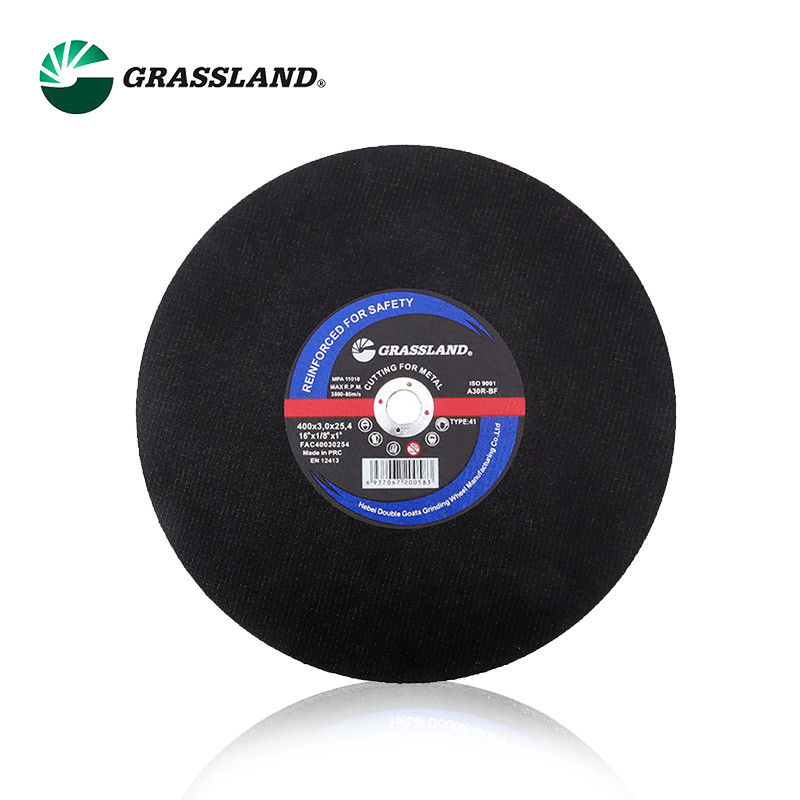What to Know Before You Buy a resin cutting disc (400mm / 16")
In fabrication shops, cost-per-cut is the quiet KPI everyone chases. Lately, the chatter I hear is consistent: reinforced 16-inch cut-off wheels are getting thinner, safer, and more predictable. To be honest, not every wheel lives up to the brochure. The Grassland Saw Blade Reinforced 400mm 16 Inch resin cutting disc has been drawing attention because it mixes EN 12413 safety creds with aggressive pricing and huge daily output. That’s a rare combo.
Quick look at the product

- Brand: Grassland (MPA EN 12413; ISO 9001)
- Model: 400×3.0×20/25.4 (16" × 1/8" × 20mm/1")
- Origin: No.88 Economic and Technological Development Zone Shucheng, Hejian, Hebei, P.R. China
- MOQ: 10,000 pcs | Price: around US$0.9–1.0 | Lead time: 30–60 days | Supply: ≈300,000 pcs/day
Product specifications (typical)
| Parameter | Spec (≈ real-world) |
|---|---|
| Diameter / Thickness / Bore | 400 mm × 3.0 mm × 20/25.4 mm |
| Bond / Reinforcement | Phenolic resin with fiberglass mesh (2–3 layers) |
| Abrasive grain | Aluminum Oxide (A24–A36; hardness T–R options) |
| Max peripheral speed | 80 m/s (≈3,800 RPM at 400 mm) |
| Target materials | Carbon steel, structural steel, cast iron; stainless variants available |
Process flow and QA (how it’s made)
Grassland’s resin cutting disc uses cold-press molding of mixed A/O grains and phenolic resin, embedded fiberglass mesh for tensile strength, then curing (≈180–200°C) and post-grind balancing. Each batch typically undergoes:
- Burst speed test to ≥1.5× rated RPM (per EN 12413)
- Static/dynamic balance checks; dimensional tolerance and bore fit tests
- Hardness and density verification; rotation test on guarded arbor
Service life? It depends on the machine, operator, and stock. In trials on a 3.7 kW chop saw cutting Ø20 mm rebar, we logged ≈60–70 cuts before diameter loss impacted performance. On angle iron and pipe, results varied (≈35–90 cuts). Your mileage will vary, but that’s competitive for this class.
Where it fits (and what users say)
- Fabrication shops and steel service centers
- Construction sites: rebar, channel, plate trimming
- Shipyards and municipalities (ductile iron pipe, guardrail)
Feedback has been pretty consistent: it tracks straight, doesn’t glaze quickly on mild steel, and the kerf is tidy for a 3.0 mm wheel. A few buyers mentioned they prefer a softer grade for stainless—easy fix via customization.
Vendor comparison (indicative)
| Vendor | Certs | Price | Lead time | OEM options | Notes |
|---|---|---|---|---|---|
| Grassland (China) | MPA EN 12413, ISO 9001 | Low–Mid | 30–60 days | Label, grit, hardness, bore | High capacity; sharp pricing |
| EU Premium Brand | EN 12413, oSa | Mid–High | 2–4 weeks | Limited | Excellent QC; higher cost |
| Generic Import | Varies | Lowest | Uncertain | Minimal | Watch for safety docs |
Customization and buying tips
- Grit/grade: choose softer grades (e.g., A24R) for stainless to reduce heat; harder (A24T) for longer life on mild steel.
- Bore: 20 mm or 25.4 mm; confirm flange compatibility and blotter size.
- Labeling/OEM: private label, shrink-wrap, carton, enhanced pallet (nice for export).
- Safety: use guards and flanges, follow ANSI B7.1/OSHA 1910.215; do a ring test before mounting.
Case notes from the field
A municipal contractor reported cutting 6" ductile-iron pipe on a stationary saw: ≈28 cuts per wheel with steady feed—respectable, considering the material. In a scrapyard test on mixed sections, the resin cutting disc held up well when operators avoided side pressure (always the Achilles’ heel of thin wheels).
Bottom line: If you want EN 12413 compliance, predictable performance, and OEM flexibility at scale, this Grassland 400×3.0 wheel is a practical, budget-sane choice.
Authoritative sources
Post time:Oct - 06 - 2025

















